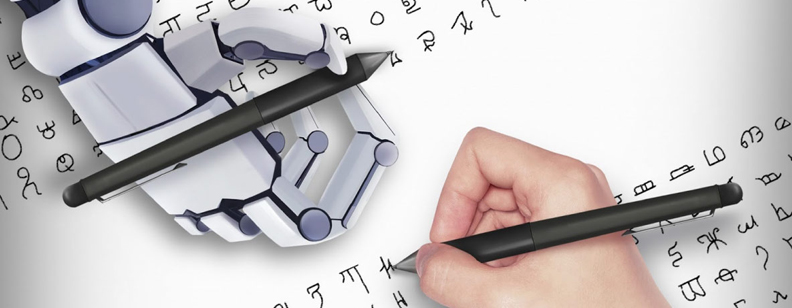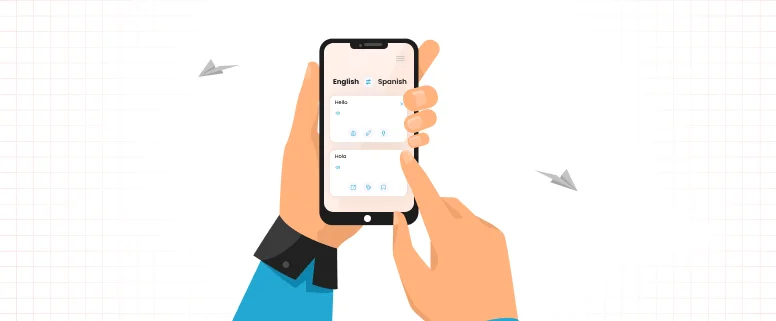Translation is usually defined as the act of transmitting the language of the source text into the language of the target text taking into consideration cultural and linguistic differences. With the development of technology information, there is a new type of software for the process of translation emerged, that is Machine Translation.
There is no doubt that nowadays machine translation is becoming more and more popular despite some problems such as ambiguity and inaccuracy of translation. However, it is widely accepted that human translation does not have the same defects. Is it likely that in the future machine will take over this role from humans?
The whole action of machine translation is done automatically, while human likely conducts the process of human translation with the assistance of translation tools.
As a new emerging discipline in the field of translation studies, the benefits of machine translation are obvious. It was an advantageous way of translation since a large quantity of articles and documents were easily translated in a short time with a low amount of money. Moreover, it is very convenient too. You open the document, select the text you want to be translated, and press the “Translate” icon. In a couple of seconds, you get German Translation, French Translation, Spanish Translation whatever language you want.
In addition, it is updating frequently, thus many latest words are inputted instantly. But if you are careful enough to check the language in which you have translated your document into, you will quickly notice problems.
Inaccuracy: Because machine is weak in word-choosing, grammatical collocations and identifying cultural difference, mostly the translation given by machine is incorrect and unreadable.
Loss of cultural connotation: Machine translation always gives word-to-word translation or literal translation. Translation tools cannot translate some texts with profound cultural meanings, because machine is run by an inflexible system, so it does not own the ability of understanding the real meaning and emotion included in the text.
Lack of language nuance: Machine translation is unable to distinguish the subtle difference in word choosing or the use of rhetorical devices. So mostly, the version translated by machine is not the exact meaning what the source text intend to.
There are just too many variables in sentence structure, grammatical aspects, idioms and linguistic expressions between two languages. What is more, there may be a lot of meanings for one word in every language. Language is always evolving, and machines cannot detect the “tone” of a text and so much more.
It is universally accepted that human translation is more accurate and reliable compared to machine translation, although human translation takes more time and money than machine. But you do not want your material to be turned into a meaningless word-for-word sentence.
If your basic purpose is to translate the thought and meaning of the document and not just words and phrases, you should take some additional time to consider the advantages of human translation.
Accuracy: The professional translators will check his or her translation repeatedly in word-choosing, grammar and sentence structure before deliver his or her work. The linguists will deal with the translation with appropriate approaches in terms of different types of source text. For example, when referring to legal, medical or technology material, accuracy is of utmost important, which needs literal translation. While in literature translation, free translation plays a more important role. A competent human translator could handle it properly to ensure their clients an accurate and specialized translation.
Cultural connotation: Only human translators can understand the importance of culture, religion and diversity when translating or interpreting a document or text.
Idiomatic expression: Many translation companies have hired native translators. The translation produced by native translators is absolutely more idiomatic than that by machine in linguistically, semantically and culturally.
Flexibility: Nowadays, most translation agencies are dedicated to customize their services to meet the needs of each individual client. Clients’ specific requirement is easy to meet from providers’ perfect customer service.
Following are the comparison between Human Translation and Google Translate:
Human Translation: It is our choices that show what we truly are, far more than our abilities. (Correct)
Google Translate: The decision of our lives, not our ability, but our choices. (Incorrect)
Compared with the above translations, we can clearly see the shortcomings of Machine Translation: grammatical mistake, unreadable, incorrect. And the human translation is fluent, logical and elegant.
Traditionally, faithfulness, expressiveness and elegance to the original have been regarded as an essential principle of translation. But the computer translation tool in this respect is far from adequate. Therefore, in order to pursue high quality of translation and avoid unnecessary awkwardness, you’d better choosing a professional translation company when necessary.
In conclusion, machine translation is good for basic things like greetings and daily expressions, but real human interaction and experience is one that a machine can never have. Machine translation is only an assistant tool, while human translation is the really terminal production. I believe that machine translation will never be able to replace human translation completely.
CCJK is an experienced and professional translation company. We are dedicated to provide the most comprehensive and excellent language services relating to any field for our clients. Before you choose us, you can try C-Store for instant free quote and know more.
Read Also: Human & Machine Translation Pros and Cons









